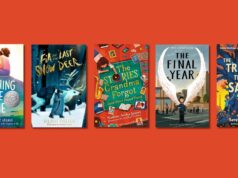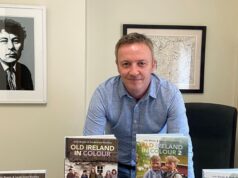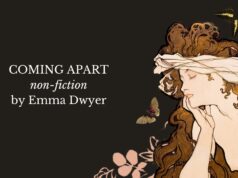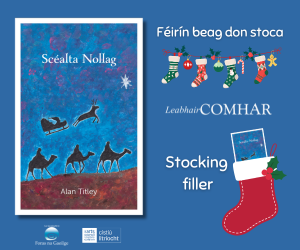

No More Mondays—a reflection on the loss of her father, by Máirín O’Mahony
Dad always hated Mondays. Little did we know this one would be his last. In many ways it was the same as any other Monday, but although I couldn’t say what it was, I sensed something was different.
No, he’s in good form, eating and drinking, watching TV, Moses the cat by his side. He’ll be okay.
Tuesday came, he was up bright and early. Got a call from the vaccination centre. Would we, or wouldn’t we? Better get it than not. Unruffled, as always, he bore it with an ouch. He chatted with the vaccinators, reminisced about a previous life when we lived by the coast. The afternoon went by as usual.
At five I said goodbye, kissed his forehead, squeezed his hand. Colder than cold, I said. He asked his usual are you alright for cash? I reminded him I had enough. My sister stayed with him.
Later, swimming up and down the pool, hands stretched out as far as I could, he was on my mind. Teaching us to swim, years ago at a beach in west Cork. Long hot summer days, picnicking on white lemonade and Marietta biscuits. Five lively young kids, one tormented Dad longing for peace and quiet, time to read his paper.
I returned to my car, loads of missed calls. My sister: Dad isn’t great, he has a rigour, can’t hold his cup.
It’s probably the vaccine, try paracetamol.
Next message, it could be a TIA.
Regular event, so not too anxious. Is Heartbeat coming on TV? It might relax him. Then he grew more unwell. After that my sister acted gallantly, getting help, staying with him, willing him to be okay. Paramedics came with siren blaring. I booted it home, foot to the ground, praying like never before.
The ambulance parked at the front door. Dad inside being assessed and treated as he struggled for breath. A different scene to the previous Sunday, sitting out in the evening sunshine, smiling and tipping his straw hat, as if bidding us all farewell.
I waved at him. He was sitting upright, hair tousled, breathing rapid, face pale and clammy. Couldn’t I hop in? Hug him, tell him he would be okay, we would be with him? Smooth his hair, kiss his forehead, hold his hand?
Everything happened so quickly. At the hospital, we eventually got to be with him. Held his hands, warm to the touch, told him we loved him. He whispered thank you. There would be more time. He’d pull through, as before. We sat by his bedside. Like the apostles we both nodded off.
When we awoke, I asked if he could have anything to give him relief. Soon after, the nurse inserted a cannula into his abdomen and gave him some medication. He relaxed, his breathing less laboured; we watched his face ease.
All the while his favourite St Faustina night prayer was playing on his new Blackberry hearing aids. A nurse approached, said the rosary in Irish—what prompted her, she has no idea.
Within an hour his breathing became shallow, and then, like a light, he was gone. How could a life so vibrant disappear, while we kept vigil, helpless, powerless, unable to make it all better?
While we knew he was very sick, we had no clue he would leave us that night. We thought he’d recover like he had twice before.
His empty chair greets us the next day as we return home without him. There is a void in our lives that can never be filled. We carry on as best we can, fill our days with rituals and routines. We listen to his play list, slowly expanding to nine hundred minutes of his favourite movies and musicals, pop stars and groups, crooners and balladeers. It’s an eclectic mix, fragments of the man who was our father.
Snapshots from his condolence book: “He was a gentleman with a wonderful sense of humour, kind compassionate, with a deep-rooted faith, knowledgeable, wise, warm and witty with a love for sport, skilled in football and hurling, historian, storyteller, inspirational teacher, educator and mentor. A rare and beautiful man. The world was a better place for him being in it.”
Life has changed forever. We have all the time now to do what we want when we want but we would trade every minute to have him back. Our house is all quiet. Our chief is gone. No more callers, no more carers, no more Mondays. Just us, and Moses the cat.
Máirín O’Mahony was a family carer until recently. She has a keen interest in creative writing. She is published on Reedsy Prompts and The New Order Journal.












